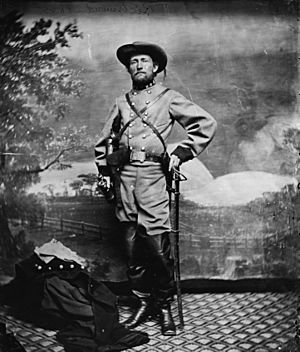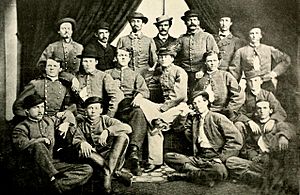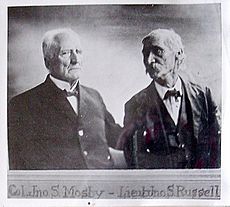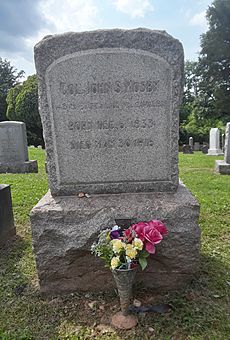John S. Mosby facts for kids
Quick facts for kids
John S. Mosby
|
|
|---|---|
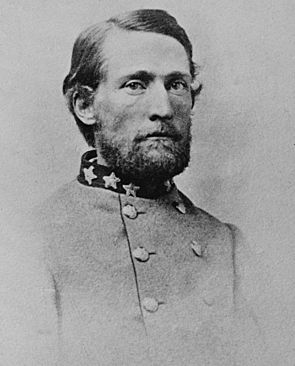
Mosby during the 1860s
|
|
| Birth name | John Singleton Mosby |
| Nickname(s) | "The Gray Ghost" |
| Born | December 6, 1833 Powhatan County, Virginia, U.S. |
| Died | May 30, 1916 (aged 82) Washington, D.C., U.S. |
| Buried |
Warrenton Cemetery
Warrenton, Virginia, U.S. |
| Allegiance | |
| Service/ |
|
| Years of service | 1861–1865 |
| Rank | |
| Unit | |
| Commands held | Mosby's Rangers |
| Battles/wars | American Civil War |
| Signature | |
John Singleton Mosby (December 6, 1833 – May 30, 1916) was a famous Confederate army cavalry leader during the American Civil War. He was known by his nickname, the "Gray Ghost". His special unit, called Mosby's Rangers, was famous for its quick attacks and for being able to disappear easily. They would blend in with local farmers and townspeople, making it hard for the Union Army to catch them. The part of northern Virginia where Mosby operated became known as Mosby's Confederacy.
After the war, Mosby became a lawyer. He even supported his former enemy's commander, U.S. President Ulysses S. Grant. Mosby also worked for the American government as a consul in Hong Kong and in the U.S. Department of Justice.
Contents
Early Life and Education
John Singleton Mosby was born in Powhatan County, Virginia, on December 6, 1833. His family moved to Albemarle County, Virginia around 1840. John went to school there.
Mosby was small and not very strong as a child. Because of this, he was often picked on by bullies. Instead of giving up, he fought back. He later said he never won a fight unless an adult stopped it.
In 1847, Mosby went to Hampden–Sydney College. He struggled with math and left after two years. In 1850, he started at the University of Virginia. He was good at languages and literature but still had trouble with math.
While at the university, Mosby got into a fight with a bully named George R. Turpin. Mosby shot Turpin with a small pistol. He was arrested and charged with unlawful shooting. Mosby was found guilty and received the maximum sentence of one year in jail.
While in jail, Mosby became friends with the lawyer who prosecuted him, William J. Robertson. Mosby told Robertson he wanted to study law. Robertson let Mosby use his law library. Mosby studied law for the rest of his time in prison. His friends and family worked to get him pardoned. The governor pardoned Mosby on December 23, 1853, as a Christmas gift. The state also removed his fine.
After being released, Mosby continued to study law. He became a lawyer and started his own practice in Howardsville.
Family Life
Around this time, Mosby met Pauline Clarke from Kentucky. They got married in Nashville, Tennessee, on December 30, 1857. They later settled in Bristol, Virginia.
The Mosbys had several children. Their son, John Singleton Mosby Jr., also became a lawyer. By 1870, the family lived in Warrenton, Virginia. Mosby cared deeply for his family. He made sure his children went to good Catholic schools in Washington, D.C. His youngest sister, Florie, even became a Catholic nun.
Civil War Career
Joining the Fight (1861)
Mosby did not support the idea of states leaving the Union at first. But when the war started, he joined the Confederate army as a private. He served in a unit called the Washington Mounted Rifles. This unit later became part of the "Virginia Volunteers." Mosby fought in the First Battle of Bull Run in July 1861.
Scouting and Raids (1862)
In April 1862, the Confederate Congress passed a law for "Partisan Rangers." These were special units that could fight behind enemy lines. By June 1862, Mosby was scouting for General J.E.B. Stuart. He helped Stuart during the Peninsula Campaign.
Mosby was captured by Union cavalry on July 20. He was held in the Old Capitol Prison in Washington, D.C.. He was released ten days later in a prisoner exchange. Even as a prisoner, Mosby gathered information. He noticed many Union ships gathering at Hampton Roads. He learned they were carrying thousands of troops to reinforce another Union general. When he was released, Mosby told General Robert E. Lee what he had seen.
In December 1862, Mosby and J.E.B. Stuart led raids behind Union lines. They wanted to cut off Union communication and supplies. At the end of the year, Mosby and other horsemen decided to form what became known as Mosby's Rangers.
Leading the Rangers (1863)
In January 1863, Mosby was given permission to form and lead the 43rd Battalion Virginia Cavalry. This unit grew into Mosby's Command. They were partisan rangers who operated in Northern Virginia. About 1,900 men served in this unit. Unlike regular soldiers, Mosby's men did not have camp duties. They lived among the local people. They also shared in the valuable items they captured from the enemy.
In March 1863, Mosby led a daring raid deep inside Union territory. He and his 29 men captured three Union officers, including General Edwin H. Stoughton. Mosby found Stoughton in bed. When the general asked who he was, Mosby replied, "I am Mosby." They captured the general, two captains, 30 soldiers, and 58 horses without firing a shot.
Mosby was promoted to captain two days later. He became a major on March 26, 1863.
On May 3, 1863, Mosby attacked and captured a supply depot at Warrenton Junction. On May 29, he led a raid in Greenwich, Virginia, derailing a supply train. On June 10, Mosby led 100 men across the Potomac River to attack a Union camp in Seneca, Maryland. They defeated a Union cavalry company and burned their camp.
Mosby was seriously wounded on August 24, 1863. A bullet went through his thigh and side. He recovered and returned to action a month later.
Continued Raids and Retaliation (1864)
Mosby was promoted to lieutenant colonel in January 1864 and to colonel in December 1864. He carefully chose his recruits. Each volunteer had to bring his own horse.
On September 14, 1864, Mosby was wounded again. A Union bullet hit him in the groin. He managed to escape and returned to command three weeks later.
Mosby's raids caused problems for the Union Army. General Ulysses S. Grant ordered his commander, Philip Sheridan, to deal with Mosby's men. Grant said that if any of Mosby's men were caught out of uniform, they should be hanged without a trial.
On September 22, 1864, Union forces executed six of Mosby's men who were captured out of uniform. A Union soldier pinned a note to one body that said: "This shall be the fate of all Mosby's men."
Mosby decided to respond. After telling General Robert E. Lee, Mosby ordered seven Union prisoners to be executed in return on November 6, 1864. In the end, three men were executed. Two more were shot but survived. The other two escaped.
On November 11, 1864, Mosby wrote to General Sheridan. He asked that both sides start treating prisoners humanely again. He pointed out that his men had captured and returned more of Sheridan's men than they had lost. The Union side agreed, and there were no more executions.
Mosby had his closest call with death on December 21, 1864. He was shot in the abdomen while eating with a family. He was left for dead but recovered. He returned to the war two months later.
End of the War (1865)
After General Robert E. Lee surrendered, Mosby's future was unclear. Some Union posters said Mosby was a guerrilla leader who would not be pardoned. However, Mosby received a letter from a Union general offering him the same surrender terms as Lee.
On April 21, 1865, Mosby disbanded his rangers. Many of his former rangers rode to Winchester the next day to surrender and go home. Mosby did not go with them. He rode south, planning to continue fighting with General Joseph E. Johnston's army. But he soon learned that Johnston had also surrendered.
Mosby finally confirmed that the arrest order against him had been removed. He surrendered on June 17, 1865. He was one of the last Confederate officers to do so.
Life After the War
After the Civil War, John Mosby was only 31 years old. He went back to being a lawyer in Warrenton, Virginia. For a while, he was still bothered by Union forces. But his wife and son met General Grant, who gave Mosby a special paper protecting him from arrest.
Politics and Public Service
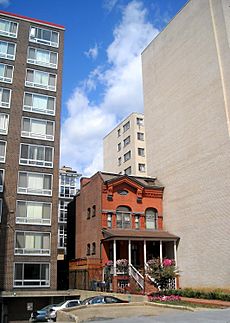
In 1872, Mosby personally thanked President Ulysses S. Grant for his help. Mosby became a Republican and worked for Grant's election campaign in Virginia. Grant later said that Mosby was "able and thoroughly honest and truthful."
Mosby's support for Grant made him unpopular with many Southerners. They still saw Grant as an enemy. Mosby received threats and even faced an assassination attempt. He later said that Virginians were more upset about him voting for Grant than about him fighting against the Union for four years.
After his wife died in 1876, Mosby moved his family to Washington, D.C. He campaigned for the Republican candidate, Rutherford B. Hayes, who became the next President. Mosby hoped for a government job. He was offered a position as the United States consul to Hong Kong. He held this job from 1878 to 1885.
In Hong Kong, Mosby found problems with how his predecessor had handled money. He worked to fix these issues and fight fraud. He even entertained his old friend President Grant, who visited him in Hong Kong.
Mosby left China after a new president was elected.
Railroad Lawyer and Government Attorney
After leaving China, Mosby worked as a lawyer for the Southern Pacific Railroad in California for about 16 years. He also wrote articles for newspapers about his Civil War adventures. He became friends with the Patton family and spent time with their young son, George S. Patton, recreating Civil War battles.
In 1901, Mosby returned to Washington, D.C. He worked for the Department of the Interior. He dealt with illegal fencing of land by cattle owners in Colorado and Nebraska. He also investigated timber theft in Alabama. Later, he worked for the Department of Justice. He investigated charges against a U.S. Marshal and land frauds involving Native American minors.
Writing About the Civil War
Mosby retired from his government job at age 76. He spent his final years in Washington, D.C., continuing to write about his wartime experiences. He had written a book in 1887 called Mosby's War Reminiscences and Stuart's Cavalry Campaigns. In this book, he defended the reputation of J.E.B. Stuart, his former general. Mosby was very loyal to Stuart, saying, "He made me all that I was in the war."
Mosby also wrote many articles for popular magazines. He published another book in 1908. He only attended one reunion of his Rangers. He noticed that many of them had become religious leaders.
Mosby kept in touch with a former slave he had, Aaron Burton, after the war. In 1894, Mosby wrote that he always understood the war was fought because of slavery. In 1907, he wrote that he was not ashamed of fighting for the Confederacy. He felt it was his duty to fight for his home, Virginia, even though he personally did not approve of slavery. He said, "The South was my country."
Death and Legacy
In January 1915, the University of Virginia honored Mosby with a medal. He died on May 30, 1916, after throat surgery in a hospital in Washington, D.C.. He is buried at the Warrenton Cemetery in Warrenton, Virginia.
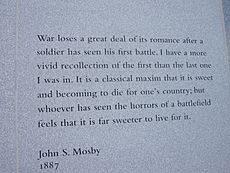
- The area around Middleburg, Virginia, where Mosby often operated, was called "Mosby's Confederacy."
- The John Singleton Mosby Museum used to be in Warrenton, Virginia. Many of its items are now at the Old Fauquier County Jail museum.
- There are 35 monuments and markers in Northern Virginia that remember Mosby's Rangers.
- John Mosby Highway, a part of US Route 50, is named after him.
- Mosby Woods Elementary School was named in his honor but changed its name to Mosaic Elementary School in 2021.
- The Mosby Woods subdivision in Fairfax City is also named after him.
- The World War II Liberty Ship SS John S. Mosby was named in his honor.
In Popular Culture
- Herman Melville's poem "The Scout Toward Aldie" was about the fear Union soldiers felt when facing Mosby.
- A 1913 film called The Pride of the South starred Joseph King as John Mosby.
- In 1924, Carrie Stevens created a famous fishing lure called the Gray Ghost.
- Virgil Carrington Jones wrote books about Mosby, including Ranger Mosby (1944). He also wrote for a TV show called The Gray Ghost in the late 1950s.
- CBS Television produced The Gray Ghost in 1957–58, starring Tod Andrews as Mosby.
- The 1967 Disney TV movie Mosby's Marauders starred Jack Ging as Mosby.
- In the 1988 book Gray Victory, Mosby is shown as the head of military intelligence after the Confederacy wins the Civil War.
- A character called "The Gray Ghost" in the 1992 Batman: The Animated Series was inspired by Mosby.
- There is a computer game based on Mosby's Civil War activities called "Mosby's Confederacy" (2008).


